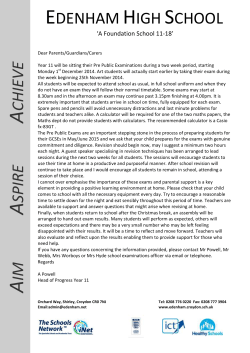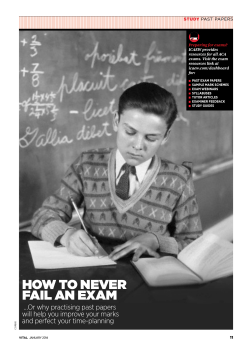
APPM 1360 Calculus II Spring 2015
APPM 1360 Calculus II Spring 2015 amath.colorado.edu/course-pages/ Lecture 110 130 140 540R 160 170 180 Time, MWF 8-8:50 AM 10-10:50 AM 11-11:50 AM 9-9:50 AM 1-1:50 PM 2-2:50 PM 3-3:50 PM APPM 1360 Lectures Room Instructor Office ECCR 200 Chang ECOT 218 ECCR 200 Chang ECOT 218 ECCR 1B40 Dougherty ECOT 220 LRVN N101 Bhat ECOT 338 ECCR 265 Bhat ECOT 338 ECCR 200 Curry ECOT 242 ECCR 1B40 Cox ECOT 343 email silva.chang@colorado.edu silva.chang@colorado.edu anne.dougherty@colorado.edu sujeet.bhat@colorado.edu sujeet.bhat@colorado.edu curry@colorado.edu murray.cox@colorado.edu Course Goals: This course extends the concepts and techniques of single-variable Calculus. The main objectives are to (1) improve integration techniques and applications of di↵erential and integral calculus, (2) understand sequences and series, and (3) improve problem solving and critical thinking skills. This class will form the basis of your set of everyday working skills required for math, engineering and the sciences. Text: Chapters 6–9 of: Essential Calculus, second edition, by Stewart. You will also need an access code for WebAssign’s online homework system. The ISBN for the book, bundled with the access code, 978-1-133-42582-3. Grade determination: There are a total of 600 points for the course. The points are distributed over written homework assignments (50 points), WebAssign homework (50 points), recitation quizzes (50 points), three midterm exams (100 points each), and a cumulative final exam (150 points). You must earn an average of 55% or better on your exams (midterms and final) in order to earn a D- or better in the course. After the final exam, if your exam scores average to less than 55%, you will earn an F in the course regardless of your homework and quiz scores. After the final exam, if your exam scores average to 55% or better, then your homework and quiz points will be factored in to determine your course grade and the approximate course grade lines will be calculated based on the following: A- 89% B- 78% C- 65% D- 55% These grade cuts may be lowered slightly (i.e. “made easier”) but they will not be raised (i.e. made harder). Exams: There will be three midterm exams and a comprehensive final. The midterm exams will be given on Wednesdays (Feb 11, Mar 11, Apr 15) from 7-8:30 pm. The final exam is Wed, May 6 from 10:30 AM –1:00 PM. Check the course webpage for exam locations. Please bring your CU ID to each exam. No electronic devices (e.g. computers, calculators, cell phones, etc.) are allowed at the exams. There will be no make-up exams or early exams. If you are unable to take an exam due to illness, you must bring a note from your doctor which sufficiently documents your illness and absence. Your course grade will then be determined by the rest of your course work. Recitations: Recitations meet for 1 hour on Tuesdays. The purpose of the recitation is partly to help you with the homework. More importantly, the recitation is intended to further clarify the Calculus II concepts. Homework: To do well in this course you must come to the lectures, work and understand the homework. Homework (online through WebAssign and written) is assigned at the end of each lecture. The written problems are due at the next recitation and the online homework is due by 8 am the day of the next lecture. Late homework will not be accepted or graded. Because of this policy, your three lowest online homework scores and two lowest written homework scores will be dropped. Solutions to the written problems will be posted on the D2L course webpage. Solutions to the online problems will be available immediately after the due date has passed. Online Homework: Online homework can be accessed through www.webassign.net/colorado/login.html Use your CU Login name (8 characters) and IdentiKey Password. Extra help: You are encouraged to get extra help. The TAs and I each have office hours, which are posted on the webpage. The TAs will hold their office hours in the Applied Math Help Room, ECCR 244. You may go to the Help Room for any Calculus 2 TA or the instructor’s posted office hours, even if they are not your regular instructor or TA. In addition, review sessions will be scheduled just before each exam. Finally, tutoring is available through the dorms, the Student Success Center in the BOLD Center, and the Engineering Fellows. Course web page: (amath.colorado.edu/course-pages/) It is your responsibility to check the course web page on a regular basis. Here you will find detailed information such as homework assignments, past exams, tutoring options, pre-exam review sessions, exam rooms and times, and office hours. In addition, it contains policies on illness, academic honesty, and special accommodations for religious holidays and documented special needs. Homework solutions will be posted on our D2L web page. Blue books: Each student is required to purchase five 8.5⇥11 blue books and give them to the TA by the second recitation (Jan 20). These will be distributed for the exams, so please do not write anything (not even your name) on the front of the blue books. Beyond Calculus II: You must receive a grade of C- or better in this course in order to advance to APPM 2350 or 2360 (a grade of C or better is required for some engineering majors). Dropping the course: Advice from your department advisor is recommended before dropping any course. After Mar 20, dropping the course is possible only with a petition approved by the Dean’s office. Academic Honesty: Students can, and should, study with others, however, all work turned in must be your own. Violation of the CU Student Honor Code (www.colorado.edu/policies/student-honor-code-policy) will result in an automatic final grade of F in this course.
© Copyright 2025










